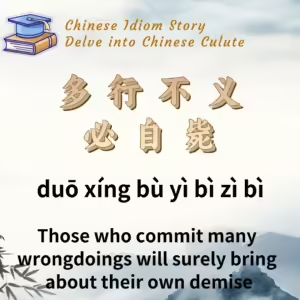
Chinese Idiom: 包藏祸心 (Bao Cang Huo Xin)
English Translation: Harboring malicious intent
pīn yīn: bāo cáng huò xīn
Idiom Meaning: This idiom refers to someone secretly harboring bad intentions or a harmful plan. “祸心” (huò xīn) literally means “a heart of misfortune” or “malicious intent.”
Historical Source: 《左传 · 昭公元年》
Idiom Story:
In the late Spring and Autumn period, around 541 BCE, the prince of Chu, Gongzi Yu (who later became King Ling of Chu), was set to marry the daughter of Gongsun Duan from the neighboring state of Zheng. Chu was a powerful southern state, while Zheng was a smaller neighboring state. To maintain a good relationship with Chu, Gongsun Duan, a high-ranking official in Zheng, agreed to marry his daughter to Gongzi Yu.
However, when Gongzi Yu traveled to Zheng to fetch his bride, he brought along his general Wu Ju and a large number of soldiers. This alarmed the ruler of Zheng, Duke Jian, who wondered why so many troops were necessary for a simple wedding. Fearing a hidden agenda, he consulted with his chief minister, Zichan (Gongsun Qiao), and they decided not to allow Gongzi Yu and his entourage to enter the city.
Instead, they sent a minister named Ziyu to meet Gongzi Yu and politely explain, “Zheng is a small country with a small capital. The city cannot accommodate so many people. Please stay outside the city.”
Gongzi Yu was displeased by this and sent Taizai Bozhouli to convey his dissatisfaction, saying, “Our lord places great importance on this marriage. If you do not allow us to enter the city, it will be a great insult to us.”
Ziyu responded, “Small countries may be innocent, yet their innocence becomes their crime. If a small country depends on the protection of a large one, but the large country harbors malicious intent, then we cannot simply stand by and allow ourselves to be harmed.”
Gongzi Yu realized that his plan to attack Zheng under the pretense of marriage had been discovered. Reluctantly, he abandoned his original scheme but insisted on entering the city for the wedding. To show that they meant no harm, the soldiers were instructed to carry their bows and quivers in a way that indicated they were unarmed before being allowed to enter.
From this story, the idiom “包藏祸心” (Bāo cáng huò xīn) came into use, describing someone who secretly harbors ill intentions.






